COMMUNITY COLLABORATION PROGRAMME
Do you have an after-school education programme running in Gauteng?
Do you want to join a community of organisations working together to deliver collective impact: improved academic achievement, excellent matric results and access to post-school opportunities, for learners in township areas?
Would you like to receive training, support and funding to achieve more impact?
The Learning Trust (TLT) and IkamvaYouth have partnered to develop and expand the Collaborative Community Programme (CCP). The CCP is a growing network of after-school programmes in Western Cape and Gauteng, where members are provided with knowledge, skills and resource-sharing opportunities. CCP aims to increase the number of high impact, sustainable tutoring programmes in South Africa.
You can get involved in various ways:
- Become a member of the wider collaborative community, where you will be invited to take part in networking, skill sharing and targeted training sessions for coordinators and tutors.
- Be selected to attend a three day Programme Coordinator Training 4-6th April 2017, this will provide know-how and tools on implementing the model and achieving results.
- Following a 3-6 month probation period, could become a grantee of The Learning Trust and an IkamvaYouth Implementing Partner, and receive bespoke capacity support in all areas of organisational development, such as the areas of strategy and M&E, fundraising and governance, and financial controls.
- Join the movement to track and monitor collective impact: use the customised data capturing tool for monitoring and tracking, and become part of a community delivering collective impact and working together to build an effective sector of after-school programmes working in an increasingly aligned and collaborative way with Government.
Criteria and Eligibility to become an Implementing Partner
*The following criteria need to be met by any organisation wanting to receive intensive training, support and programme funding:
- Be a registered NGO/non-profit
- Have been working with a consistent group of 20+ high school learners (for more than 1 year)
- Have a track-record of some consistent quality service/programme provided for at least one year
- Be located close to the urban centres of Johannesburg or Pretoria
- Have access to a pool of volunteer tutors i.e. proximity to an university
- Have a Board established, be holding regular Board meetings, and have active board members who can avail themselves for interviews
- Have a secured venue for your tutoring programme to adequately support the number of learners you have registered
- Have at least 1 full-time or a committed founder/co-founder who has been involved in the programme for at least one year and is committed to making the programme work
- Have an assistant (can be a volunteer) and a committed team of volunteer tutors
- Have a collaborative mind-set and dedication to learning, capacity building and team and wider community development
- Align closely with the 5 core values of IkamvaYouth and The Learning Trust’s values of humility, diversity, honesty and a commitment to learning.
- Be an emerging community based organisation or a more established organisation looking to improve, grow, or change its tutoring model.
In order to receive this support, organisations will also be expected to work towards compliance with IkamvaYouth’s minimum standards of quality implementation:
- Commitment: Learners need to meet a minimum 75% attendance requirement to keep their place in the programme
- Individual attention: Learners engage in small group peer-to-peer learning, striving towards a 1:5 tutor: learner ratio
- Consistency: 3 tutoring/homework sessions held per week or equivalent to 6 hours
- Sustained support: Working with learners in grades 8-12; but not enrolling new grade 12s (ensuring 2 – 5 years’ involvement for each learner)
- Impact: Willingness and ability to recruit a cohort of at least 30 grade 10s and 20 grade 11s in 2017 and be willing to use the recommended data tool for standardised attendance and outcome tracking and submission of quarterly reports
- Learning how to Learn: Applying small group tutoring methodology and peer learning rather than traditional teaching methods (training will be provided)
- Enabling access to post-school opportunities: Each grade 12 learner is paired with a mentor who helps them to apply for tertiary education, learnerships or jobs and ensures that they enrol in a post-school opportunity after matriculating
- Democratic decision making: through inclusive forums and tutor meetings constructive feedback is received from beneficiaries and volunteers
- Parental involvement: A minimum of 3 parents’ meetings held per year
THE APPLICATION PROCESS
Complete application form online and submit a motivation letter by email to zoe@ikamvayouth.org by the deadline of Thursday 23rd March 2017. If you have any questions please contact Zoe Mann on 0744767965.
Please note that before you start your online application you should have as many of the following documents available as possible:
|
?
|
Latest Annual Report
|
|
?
|
Most recent and current financial year’s operating budget (secured funds)
|
|
?
|
Latest Audited Financial Statements
|
|
?
|
NPO registration certificate
|
Successful applicants will be informed of next steps by end of day on Friday 24th March 2017.
Please ensure that at least one member of staff is available for a telephone/Skype call on Monday 27th March 2017. We will notify you of a time should your application be successful.
Please also ensure that at least two members of staff from your organisation are available for the full three day training 4th – 6th April 2017; this must include one Director/senior management and one Coordinator/Programme staff.
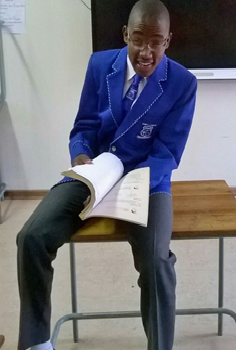
Seven tutoring programmes achieved remarkable collective impact in the recent matric exams, achieving a 92% pass rate. 97 matric learners from organisations participating in the Community Collaboration Programme (CCP) wrote their exams last year, and 84 learners achieved either bachelor or diploma passes; ensuring their eligibility for tertiary studies.

Maobi Phakwago
Moabi Phakwago joined the Tarenteraaland after-school tutoring programme in Cullinan, Gauteng at the end of grade 11 and has been diligently coming twice a week ever since. He managed to secure himself five distinctions and has been accepted to study medicine, electrical engineering, and astrophysics at some of the country’s top universities; UJ, Wits, and UCT. He describes his results as ‘just amazing and I couldn’t have done it without the tutors.’
Maobi’s message to the new class of 2017 is to ‘Start early and work hard. I remember quite well that I was told this, but I didn’t listen. So really guys, start early, work with past papers, listen attentively in class, and get help from wherever you can…but don’t forget to have a little fun as well.’’ The world is now Maobi’s oyster! Wherever he ends up, he promises to continue to pay forward the help he received by tutoring younger grades to achieve similarly inspiring results.
It is especially encouraging to see new collaborating partners achieving incredible success. My Career Corner (MCC), an organisation based in Mabopane, Gauteng helped 11 grade 12 learners to pass matric; six of whom achieved bachelor passes. One of the main feeder schools that MCC is working with achieved a pass rate of 58%. Boipelo, from My Career Corner, also recognised that ‘it is rare to see this level of commitment from learners, especially from the community and context in which they live. Generally, young people don’t value education and that is why I have been so impressed with this group’s level of dedication – that was number one for me. I am very proud of them.’ We need more people like Cheryl and Boipelo, who are stepping up to support learners and can now enjoy the amazing feeling that comes with seeing learners turn that support into tangible, life-changing achievement.
My Career Corner Coordinator, Cheryl Maepa (4th from left) with her matric class of 2016
CCP’s primary funder and capacity building partner, The Learning Trust, are ‘immensely proud to be associated with the CCP initiative and the sterling outcomes produced in 2016.’ It is thanks to the funders, and to the tireless efforts of the staff, tutors, mentors, and partners, that these learners, unlike many of their peers, could access the additional support needed to succeed.
Zoe Mann, Coordinator of the CCP, says that “After-school programme practitioners, youth workers, parents, peers, teachers, and ordinary people, all have the extraordinary power to expose young people to future possibility, and begin undoing the limiting beliefs that hold young people back. These organisations are not giving learners’ unrealistic dreams, but are showing their learners that it is possible because, with solid, ongoing support, and hard work it is happening in community-based tutoring programmes all over the country.”
Congratulations to the class of 2016 – your determination is inspiring!
About
In collaboration with The Learning Trust, IkamvaYouth established the CCP in 2014. The programme provides training, support and space for peer-to-peer learning to social entrepreneurs running tutoring programmes. The seven organisations who had grade 12 learners in 2016 were; Sozo, SALT, Just Grace, Tarenteraaland, My Career Corner, Kliptown Youth Program, and Boys and Girls Club of South Africa. In 2017 IkamvaYouth is working with 12 partner organisations across Gauteng and Western Cape, listed on the website.
IkamvaYouth is a non-profit organisation, enabling disadvantaged youth to pull themselves and each other out of poverty through education. The organisation provides free after-school tutoring, career guidance, mentoring, computer literacy training and extra-curricular engagement to learners in grades 8-12. The organisation is currently operating 16 branches in townships across five South African provinces. To find out more, go to www.ikamvayouth.org or call Zoe Mann on 074 476 7965.
The Learning Trust (TLT) is a thriving South African non-profit organisation which supports individual, emerging organisations and education clusters over a five year period. TLT increases and improves learning opportunities for young South Africans growing up in conditions of poverty and exclusion. It does this by funding and building the capacity of outstanding grassroots education initiatives, the education clusters they develop and by championing the co-ordination of the After School sector in South Africa. TLT works alongside local partners to strengthen governance and improve quality and impact, taking young, community-based organisations that demonstrate significant potential towards self-reliance.
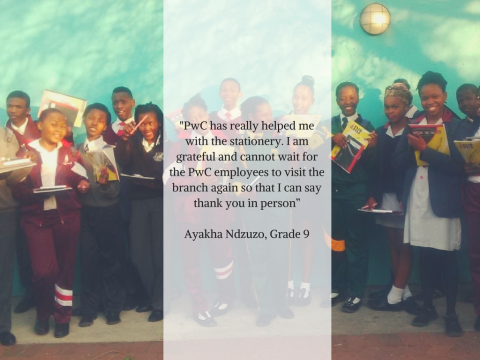
On Saturday, 27th August 2016, we received a surprise visit from one of our Accounting tutors, Nosipho Mjiyakho who works for PricewaterhouseCoopers (PwC). This was not just an ordinary visit, Nosipho was sent by PwC to drop off stationery for all our learners at the branch. This was really exciting news for us as we know that our learners are in need of stationery so we were also excited as staff to share the news with the learners.
The stationery donation included exercise books, flip files, exam pads, pens, rulers, erasers, pencils and even calculators. We are so grateful to PwC for this gift because it will really be helpful for all our learners.
We distributed the stationery packs to our grade 9 and 10 learners on Monday the of 29th of August and to our grade 11 and 12 learners on Tuesday the 30th of August. The learners were all smiles after receiving their stationery as this was really unexpected. After the Post Mandela Day Celebration at the branch earlier this month, we did not expect that PwC would come back to the branch so soon. We are really grateful.
One of our grade 9 learners, Ayakha Ndzuzo said: “PwC has really helped me with the stationery, I am grateful and cannot wait for the PwC employees to visit the branch again so that I can say thank you in person”
The Nyanga branch is thankful to PwC, its employees and our amazing superhero tutor Nosipho Mjiyakho.

On Friday 12th August 2016, the grade 9 and 10 learners were fortunate to spend some time with employees from Pricewatercoopers (PwC). It was an exciting afternoon for our learners as they were only expecting a talk before getting back to their books. Instead the PriceWaterCoopers employees brought along board games marking the beginning of a fun-filled afternoon.
The learners were divided into small groups and played different games including 30 Seconds, Monopoly, Twister, Wikipedia, Dominos, Snakes and Ladders and many more. With music playing in the background and the learners having fun with the guests, it felt like a celebration.
One of grade 10 learners, Yolanda Ntesha said: “It was enjoyable and it would be really great if PwC employees decided to come back again and spend time with us. We enjoy having visitors at the branch.”
It is always great to see people taking time out of their lives to give back to young people. We appreciate PwC for availing their employees. We are grateful as IkamvaYouth and our learners definitely enjoyed it. At the end of the event, PwC handed over food packs for the learners and trust me when I say it was a wonderful treat for our learners.
Thank you PwC ?

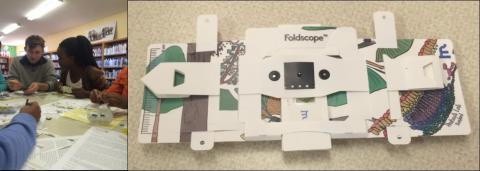
Max Coyle, a recent Biology graduate from the US, voluntarily came during his holiday time to introduce the foldscope to the Masinites. Max wanted to share his experiences of using the Foldscope with the learners, to feed their minds and make them think and see that the world is much more than what we see with the human eye.
This foldscope is a low-cost optical microscope that can be assembled from simple components, including a sheet of paper; a light-emitting diode; a watch battery that powers the LED and a lens (although natural light of lamp light can easily substitutde for the LED). This tool was developed by a team led by Jim Cybulski and Manu Prakash, an assistant professor in Bioengineering at the Stanford University. For more information you can click here and here.

Max introduced the microscope and its purpose to the learners and further took them through the assembly of the kit and how to operate it. By assembling the foldscope themselves, they got a chance to follow the instructions given by Max and put it together perfectly. The learners placed a small piece of leaf on the lens and what they saw was amazing and interesting, it brought up a lot of exciting questions! The fact that this foldscope is adjustable (can be moved up/down and side-ways) allowed the learners to see the microscopic world clearly and from different angles.
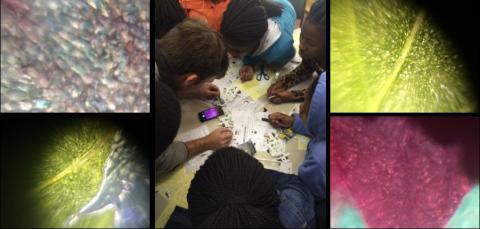
The Foldscope also comes with a feature which permits one to attach a smartphone to it, allowing the learners to take pictures and zoom into what they see. This experience left our learners quite scientific- minded :). They got to keep their foldscopes as well as extra lenses that they got from Max. Experiments like these help boost how people see and think of things. Our learners can now be their own scientists and use their foldscopes to explore what they cannot see with the naked eye!
Thank you to Max for this DIY / Biology workshop and the Masinites that took part!
Alex and I have been attending the Education NGO Leadership Summit in Benoni today, hosted by the National Education Collaboration Trust (NECT).
Godwin Khosa (NECT’s CEO) explained the reasons behind NECT’s focus on interventions at the district level; he said that ultimately, we need to focus on interventions that hold potential for changing the system as a whole. Hence, they are not focusing on the level of the learner, or at that of the school. He said that while NECT could hold Saturday classes and see increased improvement in Maths and Science, these initiatives take a lot of effort, are not systemic, and have a lower sustainability potential.
And I agree with him, in that it’s clear that the system needs an overhaul, with the functionality of schools, districts and provinces increasing dramatically. However, I’m really concerned about the idea that working at the “learner level” is seen as too much effort, unsustainable, and not systemic.
We all know that the learners currently enrolled in the system are in dire need of remedial support to overcome the deficits in their grasp of the basic fundamentals, especially with regard to literacy and numeracy. 27% of our grade 6 learners are functionally illiterate (SACMEQ, 2007), grade 9s scored an average 14% in Maths in the ANAs (2014), and only 3% scored more than 50%. In 2015, the matric pass rate was 71%, but due to heavy grade dropouts, the cohort pass rate was actually just 41%.
Khosa outlined the achievements of NECT to date. While there were some references to “evidence of improvement in the organisation of schools,” the achievements were primarily limited to a list of outputs (number of principals and HODs trained, number of resource packs availed, flash cards, management trackers, etc.) rather than outcomes. Now, while Khosa is absolutely correct that expecting to see improved learner outcomes from NECT in this early stage of its operations (just two years), I am unconvinced that this approach is sufficient for ensuring that 90% of learners pass Maths, Science and Language at above 50% level by 2030 (NECT’s very important and compelling overall objective).
As I outlined in the interview with Business Day a few weeks ago, learners’ gaps in understanding and comprehension, particularly when it comes to STEM and language subjects, require individual attention and personalized learning experiences. And while ICT provides some opportunity for offering personalised and responsive learning experiences at scale, all ed-tech people will tell you, the tech is only ever going to be a small part of what it takes to improve learner achievement.
Learners need relationships, with people who give them time, who build their trust, who help them to figure out where their gaps and challenges are, and then provide them with the academic and psycho-social support they need to dramatically improve their results and confidence. In some homes (mostly in middle class homes), parents and caregivers have the education and time to do this. Most middle class families also enroll children in after-school tutoring programmes.
Unfortunately, this additional support is unavailable to the majority of our country’s learners. It is unrealistic to expect that the education system can provide this level of individualized support to learners, especially when we consider the psycho-social challenges that learners in the lowest quintiles are up against. But the view that doing so is too difficult will ensure the perpetuation of our learners’ dismal academic performance. How can we produce outcomes at the learner level, without working with learners?
Lynn van der Elst, from Miet, said that we need to better understand Government, to put ourselves in their shoes and try understand why things work the way they do. And I think that this important point speaks to the impetus behind NECT’s decision to focus at the district level and above, as levers that make sense for systemic interventions. Government’s job is to serve the 12 million learners who are supposed to be enrolled in the system. Just providing learning materials to 12 million learners must be a colossal challenge, and so it’s unsurprising that the provision of textbooks and digital learning resources is hailed as a systemic intervention, despite the lack of empirical evidence that this will lead to improved academic achievement.
Speakers also spoke about the role of NGOs as innovators, and called for increased collaboration and stronger networks of support. The National Development Plan highlights active citizenry as one of its core pillars, and most of the speakers identified the promotion and creation of active citizenry as a key role for civil society. It is these active citizens that can step up and provide the intense level of support and care that learners need, so that we can see the kinds of radical shifts in academic achievement so desperately needed.
IkamvaYouth’s volunteer tutors and mentors are evidence of what’s possible when citizens become active. Most of these volunteers are university students, and many used to be learners in the programme themselves. By consistently showing up to meet learners where they’re at, they effectively assist learners to dramatically improve their academic results, and go on to access tertiary education, learnerships or jobs. We’re working with almost 20 other tutoring and mentoring programmes, towards achieving collective impact, and together, we will be reaching 3000 learners this year.
Deputy Minister Mr Enver Surty challenged us about the tiny size of our interventions, and encouraged us to think big. “How do we take the principles and vision of the NDP into practical reality?” There were many NGOs in the room who are indeed promoting, inculcating and coordinating active citizens. NGOs like Enke, Fundza, TEACH South Africa, Room to Read, WESSA, Partners for Possibility, Equal Education, Bridge, Section 27 and Breadline Africa. NGOs who are inspiring, recruiting, equipping and coordinating active citizens to roll up their sleeves and get involved in educating learners, providing a pipeline of educators, supporting principals, improving schools, challenging policymakers, and ultimately working towards the NDP’s big goals. While many are working together already, there is always room to better leverage the potential of collaboration. And it is only through collaboration that we’ll be able to operate at the scale that makes sense to Government.
The meeting began with a screening of Thandi’s story, which so smartly illustrates the challenges that the NDP aims to address and overcome. When Trevor Manual spoke at IkamvaYouth’s ten year birthday bash, we screened Funeka’s story, to illustrate the impact that after-school tutoring and career guidance mentoring can have. A meaningful way to contribute towards the NDP’s implementation for civil society is to mobilise and activate citizens, and to coordinate our efforts, with each other, and with Government, so that together we can reach more learners like Thandi and enable them to leverage education and improve their lives, just like Funeka.
We appreciate NECT’s efforts to bring us together, and are looking forward to future engagements. Thank you for this opportunity, which we hope is just the beginning of a more cohesive and collaborative approach to realising the NDP.



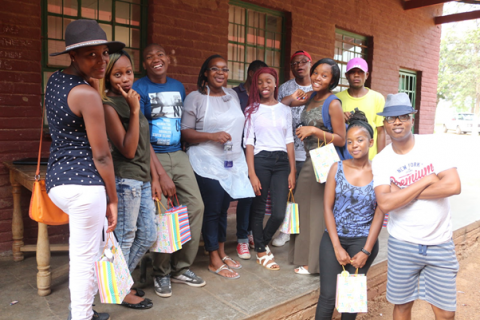








 Lloyd Lungu
Lloyd Lungu